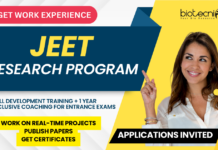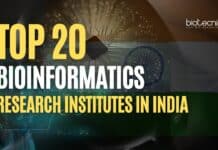Sandor Jobs For Life Sciences, Bioinformatics – Apply For Proteomics, Bioinformatics Posts
Sandor Jobs For Life Sciences, Bioinformatics – Apply For Proteomics, Bioinformatics Posts. MSc, PhD Life Sciences Proteomics, Bioinformatics and Genome Analyst Jobs at Sandor. Interested and eligible applicants can check out all of the details below
Sandor #hiring candidates for the following job positions :
1. Senior Manager/Head of Department – Proteomics
Qualification: Master in Lifesciences/Ph.D. with relevant 4-5 years of experience in Proteomics: Q-TOF, Protein profiling, MALDI, Metabolomics, Intact mass, Protein/peptide sequencing, Label free/Labelled quantification etc
2. Genetic Counsellor
Qualification: Degree in Genetic counselling with 0-1 years experience or basic understanding about exome sequencing/Genetics disorders is preferable.
3. Senior Bioinformatics/Senior Genome Analyst with 1-3 years in exome analysis variant selection and Reporting with knowledge of ACMG guidelines.
How to Apply:
Interested candidates are requested to send their resume: [email protected].
Here are 5 possible interview questions that could be asked for each of the job positions along with their answers:
Senior Manager/Head of Department – Proteomics:
Question 1: Can you provide an overview of your experience in proteomics techniques such as Q-TOF, protein profiling, MALDI, and protein sequencing? Answer: Certainly. I have over 5 years of experience in proteomics research
. I have hands-on experience with various techniques including Q-TOF for protein analysis, MALDI for mass spectrometry, and protein sequencing using modern methods.Question 2: Could you share an example of a project where you applied label-free quantification techniques in proteomics analysis? Answer: Of course. In a recent project, we utilized label-free quantification to compare protein expression levels between control and treated samples. This approach helped us identify significant changes in protein abundances without the need for chemical labeling.
Question 3: How do you ensure data integrity and accuracy in proteomics experiments, especially in intact mass analysis? Answer: Ensuring data integrity is crucial. In intact mass analysis, I follow strict quality control measures, use standardized protocols, and perform frequent instrument calibrations. This ensures accurate mass measurements and reliable results.
Question 4: Can you explain the significance of Metabolomics in proteomics research and its potential applications? Answer: Metabolomics complements proteomics by studying small molecule metabolites. It provides insights into cellular processes and interactions. For instance, analyzing metabolic changes can help identify biomarkers for diseases or monitor cellular responses to treatments.
Question 5: How do you stay updated with the latest advancements in proteomics technology and methodologies? Answer: I actively participate in scientific conferences, workshops, and engage with online forums. I also subscribe to peer-reviewed journals and follow leading researchers in the field to stay informed about the latest trends and breakthroughs.
Genetic Counsellor:
Question 1: What motivated you to pursue a career in genetic counseling? Answer: I have always been fascinated by genetics and its impact on health. Genetic counseling allows me to combine my passion for genetics with my desire to help individuals and families understand their genetic risks and make informed decisions.
Question 2: Can you provide an example of a challenging case you’ve encountered and how you effectively communicated complex genetic information to a patient? Answer: Certainly. I once worked with a family dealing with a rare genetic disorder. I simplified the technical details, used visual aids, and ensured they had ample time to ask questions. By tailoring my communication, I helped them comprehend the situation and their options.
Question 3: How do you approach counseling sessions for individuals with limited understanding of genetics? Answer: I take a patient-centered approach. I start by assessing their level of understanding and tailor my explanations accordingly. I use plain language, avoid jargon, and ensure they have ample opportunities to ask questions and express concerns.
Question 4: How would you handle a situation where a patient receives unexpected genetic test results with significant implications? Answer: Such scenarios require sensitivity and empathy. I would create a supportive environment, provide emotional support, and guide them through the implications of the results. I would collaborate with the healthcare team to ensure comprehensive care.
Question 5: In your opinion, how important is ongoing professional development for a genetic counsellor? Answer: Ongoing learning is essential in the field of genetics, which is rapidly evolving. Attending conferences, and workshops, and engaging in continuous education helps me stay updated with the latest research, technologies, and counseling techniques to provide the best care to my patients.
(Note: The answers provided are sample responses and can be customized based on the individual’s actual experience and knowledge.)
Editor’s Note: Please ensure you are subscribed to the Biotecnika Times Newsletter and our YouTube channel to be notified of the latest industry news. Follow us on social media like Twitter, Telegram, Facebook







































